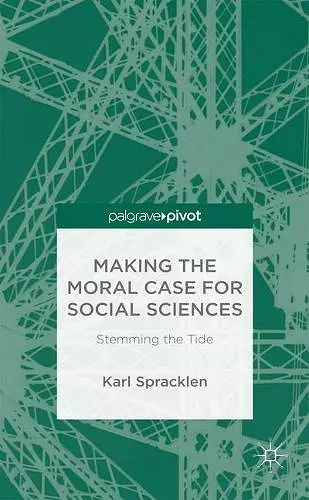Making the Moral Case for Social Sciences
Stemming the Tide
Format:Hardback
Publisher:Palgrave Macmillan
Published:3rd Dec '15
Should be back in stock very soon

"Karl Spracklen issues a clarion call for critical thinkers in all the social sciences to unite and fight. He argues that the social sciences inevitably lose when they accept the impact agenda that more easily fits the natural sciences and their associated technologies. This book shows that there is an alternative case for the social sciences. It is called critical thinking that has a lineage which runs from Ancient Greece and Rome, through Europe's renaissance and enlightenment, into modern social theories. The clarion call will certainly rouse many sociologists, but Spracklen also addresses economists and,psychologists; indeed students and scholars in all the arts and humanities." - Ken Roberts, University of Liverpool, UK "Professor Spracklen has written a trenchant critique of modern social science that everyone in this field must read. Masterfully grounded in the relevant history and philosophy from ancient Greece to the present, unlike most other such critiques, he ends by highlighting the moral strengths of the social sciences. We pursue them, he says, for the pleasure of doing and discovering, for the fact that they enable us to flourish as humans and develop as happier and equal individuals, and for their capacity to help us resist the instrumentality, injustice and inequality presently plaguing modern society. This is our moral basis." - Robert Stebbins, University of Calgary, Canada
The social sciences have a legitimacy problem in the modern world. Karl Spracklen, by contrast, makes the moral case for the social sciences, arguing that they are a necessary social good capable of fighting inequality and revealing the workings of hegemonic power.
The social sciences have a legitimacy problem in the modern world. The natural sciences are viewed as 'proper science' by journalists and policy-makers because they discover 'truths', make money, and help governments solve problems. In turn, defenders of the social sciences borrow the language of instrumentality, profit and policy impact. Karl Spracklen, by contrast, makes the moral case for the social sciences, arguing that they are a necessary social good capable of fighting inequality and revealing the workings of hegemonic power.
"Karl Spracklen issues a clarion call for critical thinkers in all the social sciences to unite and fight. He argues that the social sciences inevitably lose when they accept the impact agenda that more easily fits the natural sciences and their associated technologies. This book shows that there is an alternative case for the social sciences. It is called critical thinking that has a lineage which runs from Ancient Greece and Rome, through Europe's renaissance and enlightenment, into modern social theories. The clarion call will certainly rouse many sociologists, but Spracklen also addresses economists and,psychologists; indeed students and scholars in all the arts and humanities." - Ken Roberts, University of Liverpool, UK
"Professor Spracklen has written a trenchant critique of modern social science that everyone in this field must read. Masterfully grounded in the relevant history and philosophy from ancient Greece to the present, unlike most other such critiques, heends by highlighting the moral strengths of the social sciences. We pursue them, he says, for the pleasure of doing and discovering, for the fact that they enable us to flourish as humans and develop as happier and equal individuals, and for their capacity to help us resist the instrumentality, injustice and inequality presently plaguing modern society. This is our moral basis." - Robert Stebbins, University of Calgary, Canada
ISBN: 9781137577900
Dimensions: unknown
Weight: unknown
90 pages
1st ed. 2015